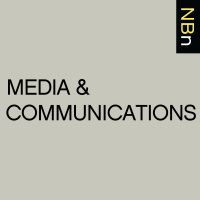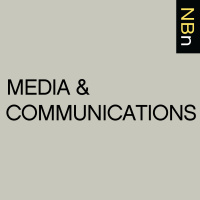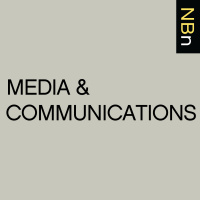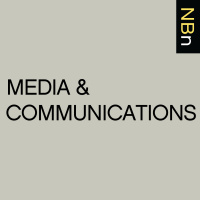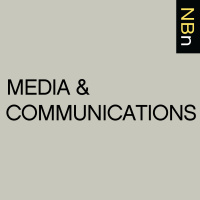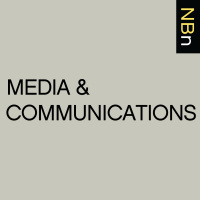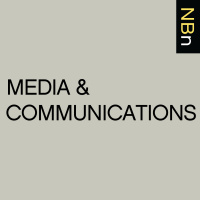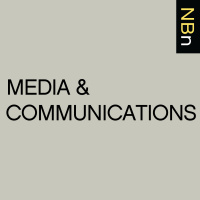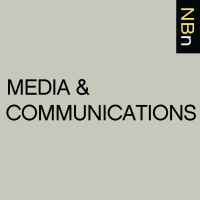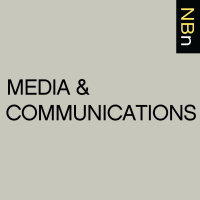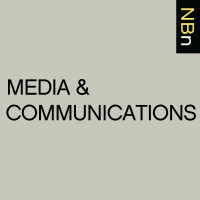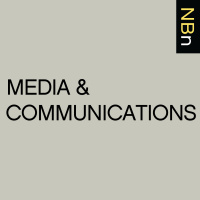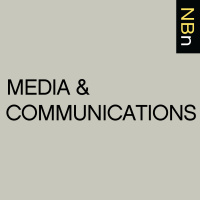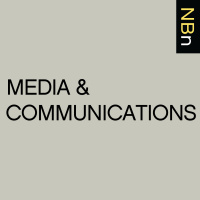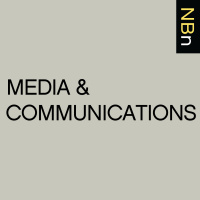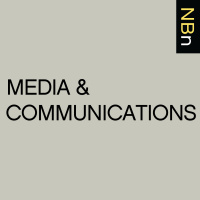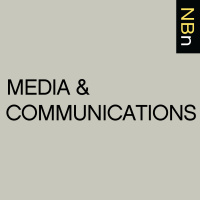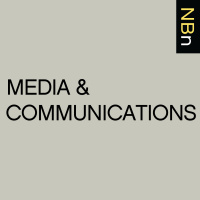Synopsis
Interviews with Scholars of Media and Communications about their New Books
Episodes
-
Sonja D. Williams “Word Warrior: Richard Durham, Radio, and Freedom” (U of Illinois Press, 2015)
23/09/2015 Duration: 01h12minSonja D. Williams‘ book Word Warrior: Richard Durham, Radio, and Freedom (University of Illinois Press, 2015) connects its subject to some of the most important events and social movements of his time, including what we now call the Civil Rights Movement and the Great Migration. Durham’s life path, like that of many other African Americans born in the early part of the 20th century, goes from the Jim Crow South, to Chicago, where his family builds a solid middle-class existence founded on educational attainment and hard work. Durham’s writing career included poetry, newspapers, radio, television, and a celebrated biography of Muhammad Ali. Durham also played a significant role in the election of the first black mayor of Chicago, his high school friend, Harold Washington. In this engaging interview, Sonja Williams sheds important light on an unassuming man who was most comfortable quietly but forcefully serving the causes he believed in from behind the scenes. Learn more about your ad choices. Visit megaphone.
-
Nicole Starosielski, “The Undersea Network” (Duke UP, 2015)
25/08/2015 Duration: 01h09minNicole Starosielski‘s new book brings an environmental and ecological consciousness to the study of digital media and digital systems, and it is a must-read. The Undersea Network (Duke University Press, 2015) looks carefully and imaginatively at the geography of undersea cable networks, paying special attention to the materiality of network infrastructure and its relationships with the histories of the Pacific. The book revises what we think we know about the infrastructure of global networks: they are not “wireless,” but wired; not rhizomatic and distributed, but semicentralized; not deterritorialized, but “territorially entrenched”; not resilient, but precarious and vulnerable; and not urban, but rural and aquatic. After providing a broad overview of three major eras of cable development – the copper cables of the 1850s-1950s, the coaxial cables of the 1950s-1980s, and the fiber-optic cables of the 1990s on, in each case focusing on the importance of security, insulation, and interconnection – Starosielski
-
Randy Nichols, “The Video Game Business” (British Film Institute, 2014)
16/08/2015 Duration: 50minVideo games have become an important cultural and economic force in our media environment. In his new book, The Video Game Business (British Film Institute, 2014), scholar Randy Nichols provides an overview of the increasingly diverse global market for video games. Nichols locates the origins of the video game industry back to the dawn of the computer age in the 1960s. He then explores the emergence of an industry around video games, noting the interdependence of hardware and software across a number of key “epochs”: from consoles to computer gaming to the explosion of mobile gaming. Throughout the book, Nichols explores key moments of transition in video games by providing institutional profiles of key industrial players in the industry. His critical analysis of power in the video game industry also explores the role of labor and audiences. Learn more about your ad choices. Visit megaphone.fm/adchoices
-
Christopher Vitale, “Networkologies: A Philosophy of Networks for a Hyperconnected Age” (Zero Books, 2014)
12/08/2015 Duration: 43minNetworks seem to be the dominant metaphor for contemporary society. In Networkologies: A Philosophy of Networks for a Hyperconnected Age (Zero Books, 2014), Christopher Vitale sets out a manifesto for understanding and using networks as the basis of a new philosophy. The book draws on continental philosophy, complex systems theory and a range of other elements to both introduce and contextualise, as well as present, the networkology manifesto. The book explores what networks are, how they emerge, how they change and how they are resilient (or not). The book intervenes in the contemporary interest in networks and will thus be of interest beyond just the critical theoretical disciplines. The text is also part of a much broader networkological project, including an original iteration of the manifesto and several papers. You can find out more about the project here. Learn more about your ad choices. Visit megaphone.fm/adchoices
-
Michael Ray FitzGerald, “Native Americans on Network TV: Stereotypes, Myths, and the ‘Good Indian'” (Rowman and Littlefield, 2013)
24/07/2015 Duration: 54minIn his new book Native Americans on Network TV: Stereotypes, Myths, and the ‘Good Indian’ (Rowman and Littlefield, 2013), Michael Ray FitzGerald reviews how television represented Native Americans, including in both positive and negative stereotypes. He talks about these portrayals from early television shows to more recent characterizations. Learn more about your ad choices. Visit megaphone.fm/adchoices
-
Jonathan Coopersmith, “Faxed: The Rise and Fall of the Fax Machine” (Johns Hopkins UP, 2015)
17/07/2015 Duration: 01h02minJonathan Coopersmith‘s new book takes readers through the century-and-a-half-long history of the fax machine and the technologies that shaped and were shaped by it, from Alexander Bain’s 1843 patent to the computer-based faxing of the end of the 20thcentury. Faxed: The Rise and Fall of the Fax Machine (Johns Hopkins University Press, 2015) chronicles the transformations of fax wrought by a range of industries and technologies in the context of world wars and global economic changes. In Coopersmith’s able hands, the history of the fax machine substantively informs a number of fields and disciplines that might not seem immediately related to it: these include visual studies (as newspapers and the military helped drive the development of fax markets and technology thanks to the need for rapid transfer of images in times of war and beyond) and East Asian studies (as fax machines can be traced through the history of modern homes and businesses in Japan). Coopersmith tells a story of fax as a story of repeated fail
-
James A. Secord, “Visions of Science: Books and Readers at the Dawn of the Victorian Age” (U of Chicago Press, 2014)
03/07/2015 Duration: 01h06minJames A. Secord‘s new book is both deeply enlightening and a pleasure to read. Emerging from the 2013 Sandars Lectures in Bibliography at the Cambridge University Library, Visions of Science: Books and Readers at the Dawn of the Victorian Age (University of Chicago Press, 2014) is a fascinating exploration of books and their readers during a moment of intense transformation in British society. Secord brings us into a period of the nineteenth century when transformations in publishing and an expanded reading public helped create a wide-ranging conversation about science and its possible futures. Out of this utopian moment several works emerged that reflected on the practices and prospects of science, and Secord guides us through seven of them in turn: the dialogues of Humphry Davy’s Consolations in Travel, the polemic of Charles Babbage’s Reflections on the Decline of Science in England, John Herschel’s moralizing Preliminary Discourse on the Study of Natural Philosophy, Mary Somerville’s mathematical On the C
-
Christian Fuchs, “Culture and Economy in the Age of Social Media” (Routledge, 2015)
28/06/2015 Duration: 56minSocial media is now a pervasive element of many people’s lives. in order to best understand this phenomenon we need a comprehensive theory of the political economy of social media. In Culture and Economy in the Age of Social Media (Routledge, 2015), Christian Fuchs, a professor of social media at the University of Westminster, brings together a range of media, social and economic theorists to explain social media. Using Raymond Williams to draw attention to the material conditions of control, production and use of social media, including case studies from the USA and China. Most notably the book insists on understanding the international division of labour behind the seemingly ephemeral aspects of online interactions. The book is essential reading for all of those active online, as well as those working in the political economy and critical theory traditions. It is available here. Learn more about your ad choices. Visit megaphone.fm/adchoices
-
Greg Siegel, “Forensic Media: Reconstructing Accidents in Accelerated Modernity” (Duke UP, 2014)
26/05/2015 Duration: 01h07minGreg Siegel‘s new book is a wonderfully engaging and meticulously researched account of a dual tendency in modern technological life: treating forensic knowledge of accident causation as a key to solving the accident, and treating this knowledge as the source for the future improvement of both technology and civilization. Forensic Media: Reconstructing Accidents in Accelerated Modernity (Duke University Press, 2014) argues that accidents, forensics, and media have been central to the emergence and evolution of this tendency. The chapters of the book trace the forms of media (graphic, photographic, electronic, and digital) that have been crucial forensic mediation since the nineteenth century, a period when the accident became “technologically modern” and the relationship between progress and catastrophe was transformed by the rise of “forensic rationality.” A series of fascinating case studies guides readers through the nature and implications of this transformation by introducing the rise of the forensic eng
-
Jon L. Mills, “Privacy in the New Media Age” (University Press of Florida, 2015)
25/05/2015 Duration: 32minThat privacy in the digital age is an important concept to be discussed is axiomatic. Cameras in mobile phones make it easy to record events and post them on the web. Consumers post an enormous amount of information on social media sites. And much of this information is made publicly available. A common question, then, is what can people truly expect to be be private when so much information is accessible. In his new book Privacy in the New Media Age (University Press of Florida 2015), Jon L. Mills (University of Florida, Levin College of Law), discusses another issue related to privacy in the digital environment: the conflict between privacy and freedom of expression. In so doing, Mills examines how the law, particularly in the United States, is always chasing advances in technology, and discusses how countries in the European Union have attempted to tackle this matter. Throughout the book he discusses famous court cases that illustrate the issues with privacy and new media in an attempt to come to a resolut
-
Timothy Jordan, “Information Politics: Liberation and Exploitation in the Digital Society” (Pluto Press, 2015)
05/05/2015 Duration: 52minStruggles over information in the digital era are central to Tim Jordan‘s new book, Information Politics: Liberation and Exploitation in the Digital Society (Pluto Press, 2015). The book aims to connect a critical theoretical reading of the idea of information with the architectures and practices surrounding information. The text begins by setting out how information is not separated from contemporary struggles over liberation and exploitation and points towards the principles of information politics that guide the reader through an engagement with contemporary theories, including the work of Haraway and Deleuze. These principles then inform theories of networks, recursion and the affordances of technologies that are used, in turn, to account for the platforms and battlegrounds of informational politics. The book does not offer up information as a new master discourse for political struggles, but rather shows, through examples including Facebook, the ICloud, the iPad, online gaming, and hacktivism, how inform
-
Naomi S. Baron, “Words Onscreen: The Fate of Reading in a Digital World” (Oxford UP, 2015)
01/05/2015 Duration: 39minScreens are ubiquitous. From the screen on a mobile, to that on a tablet, or laptop, or desktop computer, screens appear all around us, full of content both visual and text. But it is not necessarily the ubiquity of screens that has societal implications. The significance is in how screens fundamentally change how we ingest information. In her new book, Words Onscreen: The Fate of Reading in a Digital World (Oxford University Press, 2015), Naomi S. Baron, professor of linguistics and Executive Director of the Center for Teaching, Research & Learning at American University, asserts that despite the benefits of convenience and monetary savings, reading onscreen has many drawbacks. Using surveys of millennials in the United States, Japan and Germany, combined with anecdotes, and information from writers, Baron provides evidence of the impact of technology on reading, and thinking, in society. Just listen. Learn more about your ad choices. Visit megaphone.fm/adchoices
-
Jason Stanley, “How Propaganda Works” (Princeton UP, 2015)
01/05/2015 Duration: 01h05minPropaganda names a familiar collection of phenomena, and examples of propaganda are easy to identify, especially when one examines the output of totalitarian states. In those cases, language and imagery are employed for the purpose of shaping mass opinion, forming group allegiances, constructing worldviews, and securing compliance. It is undeniable that propaganda is employed by liberal democratic states. But it is also undeniable that the use of propaganda is especially problematic in liberal democracies, as it looks incompatible with the democratic ideals of equality and autonomous self-government. It’s surprising, then, that the topic of propaganda has gone relatively unexplored in contemporary political philosophy. In How Propaganda Works (Princeton University Press, 2015), Jason Stanley develops an original theory of propaganda according to which propaganda is the deployment of an ideal against itself. Along the way, Stanley distinguishes various kinds of propaganda and explores the connections between
-
Christine L. Borgman, “Big Data, Little Data, No Data: Scholarship in the Networked World” (MIT Press, 2015)
20/04/2015 Duration: 37minSocial media and digital technology now allow researchers to collect vast amounts of a variety data quickly. This so-called “big data,” and the practices that surround its collection, is all the rage in both the media and in research circles. What makes data “big,” is described by the v’s: volume, velocity, variety, and veracity. Volume refers to the massive scale of the data that can be collected, velocity, the speed of streaming analysis. Variety refers to the different forms of data available, while veracity considers the bias and noise in the data. Although many would like to focus on these details, two other v’s,validity and volatility, hold significance for big data. Validity considers the level of uncertainty in the data, asking whether it is accurate for the intended use. Volatility refers to how long the data can be stored, and remain valid. In her new book, Big Data, Little Data, No Data: Scholarship in the Networked World (MIT Press, 2015), Professor Christine L. Borgman, Presidential Chair in Inf
-
Todd Wolfson, “Digital Rebellion: The Birth of the Cyber Left” (U Illinois Press, 2014)
20/04/2015 Duration: 43minTodd Wolfson’s book, Digital Rebellion: The Birth of the Cyber Left (University of Illinois Press, 2014) examines the impact of new media and communication technologies on the spatial, strategic, and organizational fabric of social movements. Wolfson explores how aspects of the mid-1990s Zapatistas movement—network organizational structure, participatory democratic governance, and the use of communication tools as a binding agent—became essential parts of Indymedia and other Cyber Left organizations. From there he uses oral interviews and other rich ethnographic data to chart the media-based think tanks and experiments that continued the Cyber Left’s evolution through the Independent Media Center’s birth around the 1999 WTO protests in Seattle. Melding virtual and traditional ethnographic practice to explore the Cyber Left’s cultural logic, Wolfson maps the social, spatial and communicative structure of the Indymedia network and details its operations on the local, national and global level. He looks at the p
-
Robert W. Gehl, “Reverse Engineering Social Media” (Temple UP, 2014)
13/04/2015 Duration: 42minReverse Engineering Social Media: Software, Culture, and Political Economy in New Media Capitalism (Temple University Press, 2014) by Robert Gehl (University of Utah, Department of Communication) explores the architecture and political economy of social media. Gehl analyzes the ideas of social media and software engineers, using these ideas to find contradictions and fissures beneath the surfaces of glossy sites such as Facebook, Google, and Twitter. The book draws upon software studies, science and technology studies, and political economy to contextualize the institutionalization of user labor in our growing social media landscape. Looking backward at divisions of labor and the process of user labor, he provides case studies that illustrate how binary “Like” consumer choices hide surveillance systems that rely on users to build content for site owners who make money selling user data, and that promote a culture of anxiety and immediacy over depth. Gehl also goes beyond a critique of these inherently undemo
-
Christina Dunbar-Hester, “Low Power to the People: Pirates, Protest, and Politics in FM Radio Activism” (MIT Press, 2014)
25/03/2015 Duration: 42minFor the past few decades a major focus has been how the Internet, and Internet associated new media, allows for greater social and political participation globally. There is no disputing that the Internet has allowed for more participation, but the medium carries an inherent elitism and the need for expertise, which may limit accessibility. According to some advocates, old media like radio offer an alternative without the limitations of new media systems. In her new book Low Power to the People: Pirates, Protest, and Politics in FM Radio Activism (MIT Press, 2014), Christina Dunbar-Hester, an assistant professor in the School of Communication and Information at Rutgers University, explores the activist organization the Prometheus Project, and its role in advocating for greater community access to low power radio licenses. In an ethnographic examination of the medium of microradio, Dunbar-Hester examines the dichotomy of old versus new media, as well as the use of media for participatory and emancipatory poli
-
Thomas Leitch, “Wikipedia U: Knowledge, Authority, and Liberal Education in the Digital Age” (Johns Hopkins UP, 2014)
04/03/2015 Duration: 01h06minWikipedia is one of the most popular resources on the web, with its massive collection of articles on an incredible number of topics. Yet, its user written and edited model makes it controversial in many circles. In Wikipedia U: Knowledge, Authority, and Liberal Education in the Digital Age (Johns Hopkins University Press, 2014), Thomas Leitch of the University of Delaware English Department has written a book that challenges many of the criticisms of Wikipedia. Yet he also reviewed the importance of authority as an issue with all research in the twenty first century. Learn more about your ad choices. Visit megaphone.fm/adchoices
-
Frank R. Baumgartner and Bryan D. Jones, “The Politics of Information: Problem Definition and the Course of Public Policy in America ( U Chicago Press, 2014)
19/01/2015 Duration: 21minFrank R. Baumgartner and Bryan D. Jones are the authors of The Politics of Information: Problem Definition and the Course of Public Policy in America (University of Chicago Press, 2014). Baumgartner is the Richard J. Richardson Distinguished Professor of Political Science at The University of North Carolina at Chapel Hill, Chapel Hill and Jones is the J. J. “Jake” Pickle Regents Chair in Congressional Studies and Professor of Government at the University of Texas at Austin. The Politics of Information picks up where the authors’ last book, The Politics of Attention, leaves off. They explore how information enters into the policy process and how that has evolved over time, focusing on what they call the “paradox of search”. They make extensive use of the publicly available data that they have collected over the last decade called the Policy Agendas Project. They argue that: “Information determines priorities, and priorities determine action” (p. 40). They discover is that the policy process is replete with in
-
Steven Fielding, “A State of Play” (Bloomsbury Academic, 2014)
12/12/2014 Duration: 01h02minTo understand contemporary politics we must understand how it is represented in fiction. This is the main argument in A State of Play: British Politics on Screen, Stage and Page, from Anthony Trollope to The Thick of It (Bloomsbury Academic, 2014) a new book by Steven Fielding, Professor of Politics at the University of Nottingham. The book explores how British politics has been represented in fiction from the late Victorian era through to the present. The book identifies a fascinating set of core themes, including how the political class has been defended and attacked, how the idea of populism has developed over time, along with the changing role of women in British political fiction. A State of Play does not over-claim, stressing that although an understanding of fiction is essential to understanding politics, we still don’t know the exact relationship between people’s political participation and political fiction. However, it does make a convincing case that any understanding of the British political sys

